Outdoor billboards are a traditional form of advertising and — for many commuters — just another sign you pass while on the road. But over the last few months, a collection of billboards have been catching folks’ attention with their messages — and even making some feel uncomfortable:
“Black Lives Matter”
“De-escalation, Not Militarization”
“Portland…Is Your White Fragility Showing?"
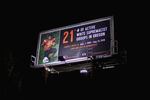
PDX Equity in Action launched its PDX Billboard Project in the spring of 2017, following the fatal police shootings of two black men.
Photo courtesy of Scott Russell
Those are just three of the seven designs that have gone up on billboards across Portland so far. The messages have appeared in more than 25 locations.
The PDX Billboard project launched late in the spring. It’s the second public anti-racism visual campaign from a group called PDX Equity in Action that spawned out of community meetings and a working group that focused on racial equity.
Organizers wanted to go beyond thoughtful discussions, so they took their message to the streets — literally.
“Portland doesn’t like to think they have an issue with race,” said Britton Washington, who runs PDX Equity in Action. “They feel like race just comes along with that progressive label, so they just get to claim the progressiveness and not do the work.”
But after the deaths of two black men in recent police-related shootings, Washington and her colleagues decided it was time to take action.
This was 2017, after the shooting deaths of Terrell Johnson and Quanice Hayes.
Related: Protesters March Through Portland To Honor Slain Teen Quanice Hayes
“We were just pissed,” Washington said.
Using one team member’s printer and their own money to buy supplies, they printed stickers and posted them along Mississippi Avenue in North Portland on the eve of the popular Mississippi Street Fair.
The stickers said, “Let’s talk about Quanice Hayes and Terrell Johnson.”
“I think we had like 500 and we plastered like three blocks of Mississippi,” Washington said. “… And some of them are still there. But most of them got taken down immediately.”
A few weeks later, Washington was at a panel discussion featuring Oregon parents who lost their children in police shootings. She was inspired by their stories.
“Like it happens and immediately following, you’re kind of bombarded by all these groups: the police, by the city, by lawyers, by whoever. And then you go through your grand jury and the officer is acquitted, and that’s it?” Washington said.
Related: After PSU Police Shooting, Black Oregonians Talk Gun Ownership
The parents talked about starting a billboard campaign similar to one they had seen by a white Wisconsin father, Michael Bell Sr., after his son was killed by police in 2004. After winning a large settlement from the city of Kenosha, Wisconsin, Bell used the money to put up nearly 70 billboards and a full-page ad in The Washington Post.
“Nobody understands what it takes to get to this level to bring this kind of awareness to it,” Bell told CBS News about his campaign criticizing the Kenosha Police’s handling of his son’s death. “The best way to describe it is that it's my duty.”
Bell’s activism led to a Wisconsin law, the first of its kind in the nation, requiring independent investigations in police shootings of civilians.
PDX Equity’s pursuit to get the billboards up was not an easy one, Washington said. Some advertising companies were unresponsive, and she had to drop and alter some of the designs in order to get the signs posted.
“The white fragility billboard originally said, ‘Portland Your White Fragility Is Showing,’” Washington said. “It was not a question.”
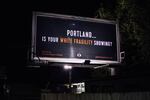
This billboard is part of the PDX Billboard Project by PDX Equity in Action.
Courtesy of Scott Russell
After executives said they only like to do positive campaigns, she agreed to add a question mark, she said.
“It is positive for me because white fragility is really harmful and it’s everywhere,” she said. “Who are you talking about when we say, ‘Make this positive?’ Because you are not talking about me, clearly.”
The white fragility billboard proved to be a point of contention for some viewers and led to “White Fragility Fridays,” in which group organizers posted emails from critics to the organization’s Instagram page.
Related: Program Aims To Teach White Liberals How To Talk About Race
One of the messages said, “Your billboards are insulting and racist, it is hypocritical bullying. They should be removed.”
Washington said there are multiple reasons for the billboards, including keeping the shooting deaths of black men by police in the public eye. But they’re also meant to disrupt.
“Nothing else has been working, so maybe we just need to stop asking and pleading and just change it,” she said. “Like just put out billboards so people have to drive by them for three months. There, right outside your house. You cannot forget."
Washington said the signs are intended to both confront whiteness — to force white viewers to think — and to let the city’s communities of color know they are seen.
“You’ve all been marginalized and you can walk out of your house and see a giant billboard that says 'Black Narrative’ on it or ‘Black Lives Matter’ on it, and you’re empowered,” Washington said.
“It’s kind of two-fold. It’s a way to reclaim space for black and brown people, especially in Portland."
The billboards are funded by grants and donations. Washington would not say how much the project has cost thus far.
David Koronda teaches classes in advertising at the University of Oregon, and he said the use of outdoor billboards in 2018 is smart.
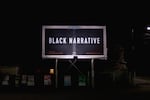
This is one of seven designs included in the PDX Billboard Project.
Courtesy of Scott Russell
“In spite of all the technology that exists today, one of the fastest ways to reach people is with outdoor [billboards],” he said.
There is no skip button. And people are habitual with their travel, whether they’re running errands or on their daily commute.
“If you have enough outdoor boards in a given market,” Koronda said, “you can virtually reach 100 percent of the mobile market even in a day.”
The latest billboard in PDX Equity in Action's campaign is located near Portland State University at Southwest 6th Avenue and Southwest Mill Street. It's a response to the shooting death of Jason Washington, a black man, who was shot and killed by university police earlier this summer. Witnesses say he was breaking up a fight when a handgun he was legally carrying fell from his side, and campus police shot and killed him.
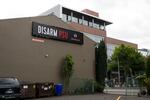
A billboard placed in downtown Portland calls for the disarmament of Portland State University police officers.
Erica Morrison / OPB
The message is written on a black background in bold white and red letters: "DISARM PSU."
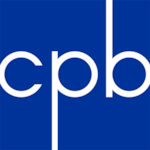
Sharing America: A Public Radio Collaboration
Erica Morrison is part of the public radio collaborative “Sharing America,” covering the intersection of race, identity and culture. This new initiative, funded by the Corporation for Public Broadcasting, includes reporters in the Northwest and Hartford, Connecticut, St. Louis and Kansas City. You can find more "Sharing America" coverage here.
